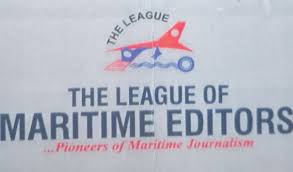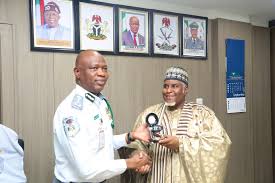By Stephen Ubanna
With barely seven weeks after the inauguration of Yusuf Abubakar led Board of the Nigerian Maritime Administration and Safety Agency, NIMASA, by Adegboyega Oyetola,a former governor of Osun state and minister of marine and blue economy with a mandate ‘’to unlocking the immense potential Nigeria’s maritime domain’, the Boad has the hit the ground running.
The minister may have re-echoed the President Bola Ahmed Tinubu’s remarks about the Constitutional role of the Federal Government, FG, Owned Governing Boards which is ‘’to evaluate policies and provide oversight functions for the agency’s operations, without interfering in its day -to-day activities ‘’, a clear message that the board mandate is strictly ‘’non -executive and policy focused’’
It would be recalled that President Tinubu, on his part had made it clear to the Federal Government, FG, owned agencies Governing Board which include that of NIMASA that that their primary responsibility is’’ to provide strategic direction, not to micromanage’’. The Nigerian President was said to have cautioned against the Board members’ interference in the day -to -day management of their respective agencies to forestall clash of interest with the Executive Management which may stifle operations.

Guided by the ministerial and Presidential advice, may have informed why the NIMASA, Board Chairman, had declared their first inaugural meeting in Lagos, the nation’s commercial nerve centre of the Board commitment to supporting the Executive Management in ‘’delivering its mandate’’.
The NIMASA Board Chairman may have gladdened the heart of the Dayo Mobereola led NIMASA Executive Management team who has a major role to play in actualising a robust blue economy potential for the country when he was said to have repeatedly declared that the Board would not ‘’interfere in the agency operations’’.
Abubakar was said to have expressed’’ satisfaction ad confidence’’ in the NIMASA Executive Management operations, believing that the team will double their efforts in the months ahead with the Board support that will make an appreciable on the nation’s maritime industry that stakeholders would heave a sigh of relief.
He had alluded to the performance bond that was signed by Mobereola, the agency’s DG and other Management team members with Oyetola, the minister of marine and blue economy, and had sounded t loud and clear that ‘’it will serve as the key Performance Indicators to measure its achievements, noting that as a board they are determined to work with the Executive Management.
The NIMASA Board Chairman, who was never short of the adjectives to use in qualifying the Mobereola, led Management team to encourage the team to do their work had emphasized that it would give all the necessary policy direction ‘’to ensure the full realization of the agency activities’’.
Mobereola, the NIMASA, Director General and who incidentally is Chairman of the interministerial Committee to promote Nigeria’s election into the International Maritime Organisation, IMO, Council, Category C, Seat, scheduled between November and December, 2025, while welcoming members of the new Board of the agency was said to have affirmed its commitment to meeting its core mandate.
Going by the Act setting up NIMASA, it has the Constitutional role of promoting and regulating the country’s shipping, maritime safety, security, and marine environment protection. Without sounding immodest, he was said to have emphasized that the support of the Board members to the Executive Management would further strengthen the agency’s capacity to drive initiatives aligned with President Bola Ahmed Tinubu’s vision for a sustainable blue economy.
The NIMASA’s Chief Executive Officer, CEO, was said to have given his words that that the Executive Management team would continue to work closely with Abubakar led Board and relevant stakeholders ‘’to foster an enabling environment for investment, enhance maritime infrastructure and build human capacity in the nation’s maritime sector.
Stakeholders had enjoined the parties to stick to their Constitutional role to move the industry forward where it could effectively compete with other maritime nations both within and outside the African Continent.
;







